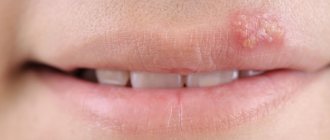Sometimes people feel a musty taste in their mouth. What are the reasons for this and what to do if obvious discomfort occurs? We will answer all questions in more detail. Each person must understand how dangerous a particular symptom is and what it may indicate.
In some situations, such a taste is easy to eliminate, and it is not associated with any internal disorders. But in other cases, this sign indicates serious problems and pathologies that can only be cured in a hospital setting. Therefore, you should not ignore it and consult a doctor for diagnosis as early as possible.
Symptoms
To determine what disease or phenomenon the taste of mold in the mouth is a sign of, you need to clarify in combination with what other problems it is detected and when exactly it bothers you.
For example, if a person has been in a room with high humidity for a long time, where there is musty, stale air, then along with the unpleasant odor, a headache, cough, and runny nose appear. It is possible that infection with pathogenic microorganisms has occurred. Similar symptoms also occur in people who work in the textile, agricultural, paper or chemical industries.
In the presence of viral or infectious diseases of some organs, additional concerns include sore throat, runny nose, inflammatory processes in the oral cavity, etc. If the taste is associated with the functioning of the gastrointestinal tract, then the patient complains of the usual symptoms in the form of frustration, nausea, vomiting and etc.
Based on these manifestations, doctors are able to suspect what specific problem influenced the appearance of the unpleasant feeling and the functioning of which organ needs to be checked more carefully.
Etiology
An unpleasant taste in the mouth hides its causes in inflammation and infection of the upper respiratory tract, sinuses, mouth and tongue. This symptom manifests itself from various pathological processes in the body. A foul taste can be caused by the progression of gastrointestinal disorders. An unpleasant sign appears in the following diseases:
- esophagitis;
- gastroesophageal reflux disease;
- flatulence;
- ulcer.
Doctors also identify a number of other etiological factors for the appearance of the symptom, namely:
- bacteria and infections;
- dehydration;
- medicines;
- mouth erosions;
- improper oral hygiene;
- damage to the sinuses;
- Sjögren's syndrome;
- smoking;
- tumors;
- viruses.
Taste in the mouth can also appear from more serious and severe pathologies. If a symptom appears frequently, the patient should consult a doctor, since the manifestation may be characteristic of the following diseases:
- oral cancer;
- severe infection;
- stroke.
An unpleasant taste is typical during pregnancy. In women, this phenomenon occurs due to the production of a hormone, the appearance of which leads to such changes in the body.
Causes of taste in mouth
Based on when this sensation appears, you can suspect why it happened:
- After a recent filling or dental treatment at the dentist, the taste turns out to be temporary and goes away on its own after a few days.
- If you installed crowns or dentures made from low-quality materials, then you will have to replace them with new ones or ones that are safer for the body.
- When such a taste bothers you in the morning, immediately after sleep, this indicates not so much a health problem as a mold outbreak somewhere in the room. You will have to carefully examine the house.
- In some cases, a similar unpleasant sensation occurs after brushing your teeth. This means your toothbrush needs replacing. With prolonged use, pathogenic bacteria accumulate between the bristles and the hygiene procedure ceases to be useful.
And yet, sometimes the taste of mold is a symptom of some internal disease:
- sinusitis – when the paranasal sinuses are affected, a runny nose, headaches and an unpleasant taste in the mouth occur;
- tonsillitis - a disease characterized by inflammation of the tonsils and lymphoid tissues, which is accompanied not only by unpleasant sensations, but also by fever and sore throat;
- pathologies of the gastrointestinal tract - often when the acidity in the stomach changes or other disturbances in the functioning of these organs, the composition of the salivary secretion, taste sensations, and the microflora of the oral mucosa also changes in a similar way;
- Aspergillosis is a rather dangerous disease when fungi of the genus Aspergillus affect the internal systems of the human body.
But this is not always directly related to pathological processes. For example, if you have a moldy taste in your mouth while eating, it only means that the product you are eating has gone bad. And in order not to provoke the development of any pathology, it is better to throw it away and rinse your mouth with clean water.
Symptoms
A strange taste in the mouth is not a good sign and can signal a pathology in the body. Since the symptom most often manifests itself in serious diseases, along with the foul taste and smell, the patient is overcome by other unpleasant symptoms.
With gastrointestinal disease, signs of the disease spread to other organs. To identify pathology of the digestive tract, you should pay attention to the presence of the following symptoms:
- stomach pain;
- flatulence;
- cough;
- heartburn;
- stool disorder.
In case of problems with the salivary glands, the patient develops other signs in the body. The patient complains of:
- difficulty opening the mouth;
- dry mucous membranes;
- high temperature;
- pain in the face and mouth;
- red spots on the face and neck;
- swelling of the neck and face.
Symptoms may also appear in the nose and sinuses. Such a disease is characterized by the following manifestations:
- fatigue;
- high body temperature;
- headache;
- discomfort in the throat;
- nasal congestion;
- tonsillitis.
Due to the fact that the symptom may indicate more serious diseases, stroke, infections or mouth cancer, the signs appear more intense and more characteristic. The following indicators will inform a person about the presence of serious diseases:
- labored breathing;
- elevated temperature;
- weight loss;
- loss of vision, hearing and smell.
Diagnostics
When a moldy taste occurs, you need to decide what it is and whether you should worry about it. You should consult a doctor as soon as possible and have your body checked. To do this, it is enough to visit a therapist, who, if necessary, can refer you to other specialized specialists - dentist, otolaryngologist, gastroenterologist, pulmonologist, etc.
First, a standard examination and history taking procedure is carried out. It is important that women or men who consult a doctor talk about all the symptoms that bother them and about the specifics of their work. Further, if necessary, the following examinations are prescribed:
- Ultrasound of internal organs;
- oral scrapings;
- blood tests;
- checking sputum for the presence of Aspergillus fungi;
- X-ray of the lungs;
- antibody test;
- biopsy;
- immunogram.
Depending on what the tests showed and what problem was discovered, appropriate therapy is prescribed.
Treatment of aspergillosis
Regardless of the type of infection, treating aspergillosis is a very labor-intensive task.
Chemotherapy and antibacterial agents do not lead to the expected effect, as indeed do all other methods of combating infectious diseases known to doctors. For this reason, in recent years, when aspergillosis is diagnosed, treatment is based on the use of surgical methods. Patients undergo a lobectomy with resection of the affected organs. If the operation was performed by a competent specialist in compliance with all established procedures, the intervention is tolerated without complications and gives a good prognosis for the future. For advanced forms of pulmonary aspergillosis, surgical treatment is used in conjunction with conservative methods. Patients with aspergillosis are prescribed amphotericin B, oxacillin, nystatin, erythromycin, and tetracycline antibiotics. At the same time, the person takes vitamins. Also, for patients with aspergillosis, restorative treatment is recommended. When using antifungal drugs, the amount of antibodies in the blood increases sharply, but by the end of treatment it returns to normal. If pulmonary aspergillosis leads to lesions of the skin and mucous membranes, patients are recommended to take antifungal and anti-inflammatory drugs.
As for treatment prognosis. Pulmonary aspergillosis is fatal in 20-35% of cases (in HIV-infected patients, the mortality rate reaches 50%). When the mucous membranes and ENT organs are infected, the prognosis is usually favorable. In the septic form of aspergillosis – unfavorable. It is very important to identify the symptoms of the disease in time and make the correct diagnosis, therefore, the sooner the patient consults a doctor with complaints about the deterioration of the condition, the higher the chance that treatment will save the person’s life.
Treatment methods
If the cause of the unpleasant taste is a fungus, then a diagnosis of aspergillosis is made. From various moldy products or premises, pathogenic bacteria enter the human body and most often affect the sinuses and lungs. You need to understand that if you do not consult a doctor in a timely manner, this disease leads to serious consequences and various complications. The treatment itself takes place mainly in a hospital under strict medical supervision.
To get rid of this pathology, the patient is prescribed:
- special antifungal drugs (Micofungin, Itraconazole, Voriconazole, Posaconazole, Caspofungin);
- for more serious damage, antibiotics are needed (Nystatin, Etrithromycin, Amphotericin, Amphoglucamine);
- it is important to take vitamin complexes with a high content of vitamin B (Neurobeks, Neuromultivit, Neurobion);
- do inhalations with euphilin or potassium iodide;
- if skin infection occurs at the same time, then specific rashes can be removed with the help of antifungal ointments;
- in case of pain, you should use analgesics (Olfen, Ketanov);
- in advanced cases, part of the lung has to be surgically removed.
If a person is infected with the Aspergillus fungus, then using folk remedies will not be able to get rid of it. Powerful medications are definitely needed. But some recipes will help cope with unpleasant symptoms:
- Decoctions of calendula flowers or eucalyptus leaves are used to rinse the mouth to get rid of unpleasant odor and inflammation of the mucous membranes.
- A special decoction based on plantain helps reduce discomfort in the lungs.
- Viburnum berries, fresh or in the form of compote, have antifungal and immunostimulating effects.
- Blue iodine has proven itself well in this regard. For the procedure you need to take only a few crystals of citric acid, 1 tsp. sugar and the same amount of starch. All this is poured into 150 ml of warm water and boiled. At the end of cooking, add 1 tsp. blue iodine.
If the taste of mold in the mouth has become a sign of tonsillitis, then the doctor will prescribe rinses made from medicinal herbs or ready-made antiseptic solutions (Chlorhexidine, Iodinol). When the body temperature rises at the same time, antipyretics are needed.
Sinusitis is treated with antibiotics, anti-inflammatory and antihistamine drugs. In addition to this, the patient is recommended to rinse the sinuses more often, do inhalations, and prescribe vasoconstrictor drops and physiotherapeutic procedures.
Video: about bad taste in the mouth.
Aspergillosis
Aspergillosis is an infectious disease of the skin, lungs, paranasal sinuses and other internal organs caused by moldy fungi Aspergillus. These fungi enter the human body by inhaling spores. Of particular concern is the fact that they are widespread in nature and are found not only in soil, flour or cereals, but also simply in dusty rooms. Cases have been recorded in which certain forms of aspergillosis (for example, pulmonary aspergillosis) affected people even in a hospital setting. The cause of aspergillosis is still the same – dust and insufficiently responsible attitude towards cleaning premises. In some cases, symptoms of aspergillosis manifest as an endogenous infection, but this is rather the exception to the rule and is only true for people with weakened immune systems. In recent years, the problem of aspergillosis infection in persons with various immunodeficiencies has become quite acute. Suffice it to say that pulmonary aspergillosis is detected in 20% of patients diagnosed with HIV. First, aspergillosis affects the lungs, then the pleura and lymph nodes. Aspergillosis spreads through blood vessels to other organs. Very often, pulmonary aspergillosis turns into generalized (septic), which in 50% of cases leads to the death of the patient. Let us note that the disease is not transmitted from person to person.
Prevention
To prevent dangerous diseases due to fungal infections entering the body, you must adhere to the following rules:
- Regularly and thoroughly ventilate the room, monitor humidity levels, and clean.
- When working in production, you should adhere to safety measures, wear a respirator or protective masks.
- Don't eat spoiled foods.
- Since infection most often occurs against the background of reduced immunity, you should try to lead a healthy lifestyle and treat various diseases in a timely manner.
- You should visit your dentist twice a year to prevent infections in your mouth.
- Avoid prolonged exposure to mold indoors.
- Change your toothbrush every 3-4 months.








